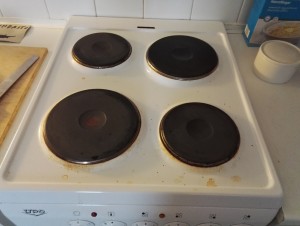 Cleanliness is next to godliness is an ancient aphorism I suddenly bumped into whilst minding my own business on the magical world of the Internet. It prompted me to question the very nature of housekeeping, which until recent times has seemed to me a package of chores one simply has to deal with. Still, since my social life has greatly been revitalised by the fabled uni experience, I’ve come to see all sorts of households over these past few years – and the states of those households have varied quite considerably. And I wonder, why do I find myself surprised by this?
Cleanliness is next to godliness is an ancient aphorism I suddenly bumped into whilst minding my own business on the magical world of the Internet. It prompted me to question the very nature of housekeeping, which until recent times has seemed to me a package of chores one simply has to deal with. Still, since my social life has greatly been revitalised by the fabled uni experience, I’ve come to see all sorts of households over these past few years – and the states of those households have varied quite considerably. And I wonder, why do I find myself surprised by this?
I grew up with two brothers, both of whom can be said to have subscribed to an unquestionably messy way of life in their youth. I cannot state with honesty that I was any better – I certainly never had any aspirations to become a godly, or even a cleanly person. As a child, I distinctively remember complaining to my mother about having to perform a weekly cleaning of the room I shared with my dear brother.

Well, the complaining was of no use. Her trump-card for overruling any argument I ever made was expressing the possibility of the President of Finland coming over for a sudden visit. It would be far too embarrassing to present the household in that current state for the head of state, so cleaning was absolutely necessary, she reasoned. To a child this made perfect sense, although, at times, I must’ve questioned the validity of her rhetoric.
Like most every other boy, my brother and I eventually discovered the seemingly flawless strategy of relocating various objects that lay on the floor under our beds. Out of sight, out of mind – right? Alas, our mother, ever-vigilant, always made sure to check beneath the beds, rendering our genius stratagem obsolete. Eventually, we got a large wooden trunk from our father as a gift; with the trunk came a certain household truce. Unneeded belongings swiftly found their way into the trunk – and lo, the floor beneath the beds could be vacuumed once again! The actual purpose of said trunk still remains unknown to me, to this very day – in any case: thanks, dad.
As time goes by, boys become men. However, their habits do not always change. My brothers never grew unaccustomed to their gleeful neglect towards maintaining order. As teenagers, we used to joke about the second law of thermodynamics applying to housekeeping; in view of this, cleaning became redundant. Still, after moving out, I feel as though housekeeping suddenly became a way for me to express myself.

Moving out and starting studies at the university was a game changer in many ways. I no longer had to do things just because someone else told me to or expected them of me; the world was finally my oyster. Well, the flat, anyway: a whole new world of possibilities, contained in just some fifty five square metres.
But like ever-so-often, with the opportunities came the responsibilities – while I was out on a night of heavy drinking with new-found friends, the flat collected dust. As I crawled home, I neglected the dishes, the laundry, and the general disorder. And all of these things had the audacity to remain there when I woke up! Even worse, sometimes they seemed more disorderly than the night before! Yet, I have to admit: this was no conspiracy against me, but the comeuppance I deserved.
And so, just like that, housekeeping became something I had to allot time to – just like any other activity. However, with all the deadlines and stress modern university education provides to a student of English, housekeeping also became a convenient way to take my mind off of things. Somewhat unexpectedly, I gained insight into this during a session of Literature Tutorial. Our wonderful instructor, Nely Keinänen, offhandedly asked the class whether we felt an urge to take care of household chores before taking on any writing process. Whilst the question was seemingly nonchalant, I raised my hand, to my amazement, along with most of the class. This is when the realisation hit me: these people all face, more or less, the same experience I do in housekeeping; yet, few students seem to pay it the respect or attention it is due to.
How can we accomplish this, then? Those of you who have had the (dis)pleasure of ever having me visit your home must surely have noticed that I have a tendency to praise an orderly household or any cool decorative objects housed therein. I, personally, rarely admit any visitors to my flat, but those that have visited have likewise commented on the tidiness – I firmly believe these are not just empty words of politeness, but genuine gestures of good-will; as such, they must warm the hearts of the recipients.

My fellow students and human beings, it is imperative that you pay attention to your surroundings and do not feel prohibited by any social code to make such pleasant remarks, embarrassing as they might seem. Men in particular seem to have difficulties in doing so: whenever I visit a male friend for an evening of casual beer-gulping, the state of the household is rarely discussed. Of course, if your fellow student’s flat is in disarray, it might be a difficult task to find something positive to say about it. Also, let us not forget that there are arguments to be made for healthy messiness, too.
To continue on the topic of disarray, I have conversed with a student friend of mine who lives in a flat arranged to him by the great HOAS. I’ve known this particular friend for some year and a half now, and only once (he ardently claims otherwise – I do not believe him) has he cleaned his apartment. I find it truly baffling.

One time after a night of drinking, with me sleeping over, I engaged him in a conversation about the plight of his place. I questioned whether he felt that his living situation, due to it being a HOAS flat, felt temporary, therefore leading to his neglect of what I deem proper housekeeping. I cannot recall his exact answer – to paraphrase, he must’ve bitten his thumb at me.
Still, I wish he’d clean up the pad, even if the President isn’t coming around any time soon.
